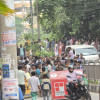The jarring experience of visiting parents’ hometown

I recall standing on the hilly terrain of my mother's childhood home, fascinated by a squirrel feeding on a tree bud nearby, when my cousin quipped, "One would know at a glance that you're not from around here."
I was born in Dhaka to parents who had moved here from Sylhet in the '90s. I have dwelled within the bustle of Dhaka my entire life and it's the only place I call home. But, much like countless Bangladeshis, I have been straddling two subcultures – the traditions I've inherited from my parents' native towns and the conventions of my urban abode.
Aside from experiencing idyllic landscapes and meeting my favourite cousins, visits to my parents' hometown have been riddled with cultural shocks and palpable estrangement.
I stand out like a sore thumb among most natives. My clothes and candid opinions exceed the local threshold of propriety. In the close-knitted rural town, I'm a stranger trying to shrink away from inquisitive gazes. My palate cannot appreciate the bitter taste of beloved Sylheti Tenga or the doughiness of handesh pitha.
Distant relatives enjoy comparing me to my parents. They ungraciously point out how I don't resemble my mother and make conjectures on why I haven't inherited her pale skin. Some try to weigh in on my accomplishments while some offer me unwelcome career counselling.
I have always conversed in the Sylheti dialect at home. Shuddho Bengali is reserved for communication outside the family. Years of practice facilitates both dialects to smoothly roll off my tongue. But when I'm talking to a resident Sylheti, I struggle to differentiate between undertones of their speech. Even my parents' accents become more pronounced. I have trouble catching on to conversations peppered with jargons and lexicons, stemmed from local lore and contextual influences.
Hometowns generally consist of elders who share archaic ideologies. Which means you will be exposed to their hubristic, sexist, and xenophobic opinions. To make it worse, you'll be expected to keep silent and casually brush off their regressive comments. Otherwise, you risk getting your non-native upbringing unfairly slated.
Over time, the weight of morphing expectations may change how you feel about your hometown. You are expected to show an inexplicable loyalty to your place of descent. Renouncing certain regional traditions and beliefs that you do not identify with may no longer be excused as childlike naivety, rather be culpable as conscious indifference towards blending in.
For those of us raised in nuclear families without having spent substantial time at our hometowns, the emotional disconnection makes it harder to familiarise ourselves with the complex web of family relationships. How can you fulfil your duties towards twice removed blood relatives you cannot even recognise?
This "homecoming" negates sugar-coated depictions of kinship and bares the ultimate ugly truth: diversity and distance in upbringing can diverge aspirations, emotions and expectations. Blood may be thicker than water but it cannot form lasting attachments by itself.
As such, it's important to unapologetically accept that you may never be comfortable at your parent's hometown. This does not entail that you're betraying your "roots". One cannot abandon an identity they could not embrace in the first place.
Nuzha forgives people for pronouncing her name wrong and wallows in books and anxiety. Suggest her fiction at [email protected]

 For all latest news, follow The Daily Star's Google News channel.
For all latest news, follow The Daily Star's Google News channel. 







Comments